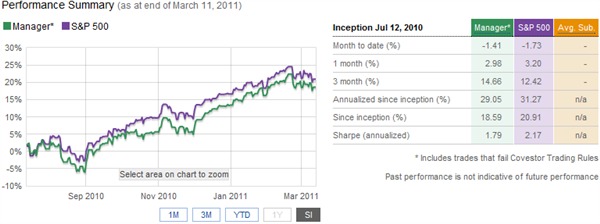by Michael Tarsala
The Conference Board’s consumer confidence index fell to its lowest point since November, a shockingly bad number that surprised several investment managers on the Covestor platform.
“Well, I can tell you that my confidence is shot,” said Bill DeShurko at 401 Advisor, manager of the Dividend and Income Plus investment model. “Based on this latest confidence number, the economy is still softening. At this point, I think the consumer is tapped out.”
The index came in with a reading of 60.6, down 4.8 points from the previous month, it was the biggest monthly decline since October. The reading was even worse than the most pessimistic economist assumption in a Bloomberg survey.
Rising gas prices and petering demand for autos took their toll on the confidence reading, according to DeShurko.
His investment strategy is accounting for continued consumer weakness; as a result, he continues to invest heavily in low-beta stocks. All but one name in his investment portfolio has less volatile price action than the S&P 500, based on its beta.
DeShurko also has very limited exposure to consumer stocks, with the exception of McDonald’s (MCD), which he says may benefit when consumers begin to spend less at pricier casual restaurants.
“I am not optimistic about the economy either, based on these latest numbers,” added John Gerard Lewis, manager of the Stable High Yield investment model. “I think that this economy is in dire straits, and that it could be that way for a long, long time.”
Lewis does not have exposure to consumer-oriented stocks, with the exception of mortgage REITs. He has very few traditional dividend-paying stocks in operating companies in his portfolio, as well.
If you would like to talk about defensively-minded investment options, contact us at Covestor.
We offer 15 different investment models, including the two mentioned above, with an indicative yield current yield of 4.5% or greater, more than double the S&P 500 dividend yield of just under 2.2% as of August 27.
Those figures are based on the last known dividend and is shown as an annualized rate for all stocks in the investment model. It takes into account the cash held in the model, as well as long and short positions. For preferred shares, the yield to maturity is used. It’s not a measurement of the future yield, in other words.
For more information, give us a call at 866-825-3005, X 703. We would welcome the chance to talk to you about our investment models and to help you decide if one or more of them might be right for you.
Photo by: Mad SaiyanTist



